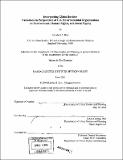| dc.contributor.advisor | JoAnn Carmin. | en_US |
| dc.contributor.author | Bast, Elizabeth S., 1977- | en_US |
| dc.contributor.other | Massachusetts Institute of Technology. Dept. of Urban Studies and Planning. | en_US |
| dc.date.accessioned | 2005-06-02T18:14:53Z | |
| dc.date.available | 2005-06-02T18:14:53Z | |
| dc.date.copyright | 2004 | en_US |
| dc.date.issued | 2004 | en_US |
| dc.identifier.uri | http://hdl.handle.net/1721.1/17684 | |
| dc.description | Thesis (M.C.P.)--Massachusetts Institute of Technology, Dept. of Urban Studies and Planning, 2004. | en_US |
| dc.description | Includes bibliographical references (p. 91-95). | en_US |
| dc.description.abstract | Environmental movement organizations in the United States have engaged with the global justice movement differently depending on the extent to which they view human rights and social equity issues as part of their environmental work. These organizations, influenced by their organizational history and their work with international groups and coalitions, appear to view these issues and engage with the movement in distinct ways. Some organizations have concentrated on seeking out the root causes of environmental destruction, which has led them to target corporations and corporate practices. These organizations have become involved with the global justice movement from the anti-corporate point of view. Other environmental movement organizations have explicitly incorporated human rights and social equity concerns in their view of environmental problems. These organizations tend to critique international institutions for their inattention to human, as well as environmental, problems, and approach the global justice movement from a human rights and development perspective. This thesis suggests that there are nuances, even within organizations with roots in the same movement, in how organizations interpret and engage with the global justice movement. Some environmental groups may relate to the anti-corporate nature of the movement, while others are drawn more to the human rights and development components. | en_US |
| dc.description.statementofresponsibility | by Elizabeth S. Bast. | en_US |
| dc.format.extent | 95 p. | en_US |
| dc.format.extent | 3831942 bytes | |
| dc.format.extent | 3831750 bytes | |
| dc.format.mimetype | application/pdf | |
| dc.format.mimetype | application/pdf | |
| dc.language.iso | eng | en_US |
| dc.publisher | Massachusetts Institute of Technology | en_US |
| dc.rights | M.I.T. theses are protected by copyright. They may be viewed from this source for any purpose, but reproduction or distribution in any format is prohibited without written permission. See provided URL for inquiries about permission. | en_US |
| dc.rights.uri | http://dspace.mit.edu/handle/1721.1/7582 | |
| dc.subject | Urban Studies and Planning. | en_US |
| dc.title | Interpreting global justice : variations in perspectives of U.S. environmental organizations on environment, human rights, and social equity | en_US |
| dc.type | Thesis | en_US |
| dc.description.degree | M.C.P. | en_US |
| dc.contributor.department | Massachusetts Institute of Technology. Department of Urban Studies and Planning | |
| dc.identifier.oclc | 56394599 | en_US |
